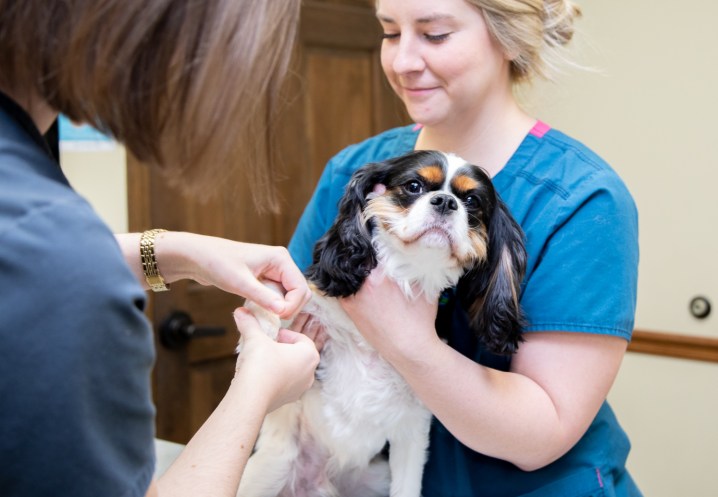Managing Skin & Allergy Issues
The veterinarians at our Western Carolina Regional Animal Hospital & Veterinary Emergency Hospital can treat your pet's dermatological (skin) and allergy issues.

What do dermatology services cover?
Dermatological services help manage and prevent diseases of the skin, ears, nails, and coat that can originate from a variety of sources, including allergies.
As veterinary professionals, we know that chronic recurring allergies, skin problems, and ear infections can be intensely aggravating to your pet and baffling for you as a pet owner.
That's why we take care to identify issues and proactively remedy them as soon as possible.
Our Dermatological Services
Western Carolina Regional Animal Hospital & Veterinary Emergency Hospital offers the following dermatological services:
- Diagnosis & treatment of skin cancer and tumors
- Allergy testing, diagnoses, and treatment
- Treatment of mites (demodex and scabies)
- Diagnosis & treatment of hair loss and hormonal disease
- Laser treatment for skin disorders
- Treatment of ear and nose disorders
- Diagnosis & treatment of paw and nail disorders
- Identification & treatment of immune disorders
- Identification of underlying cause of seborrheic and breed disorders
FAQs About Skin Problems & Allergies
Read below for some of the most commonly asked questions about pet allergies and skin irritations.
ASK A DIFFERENT QUESTION
- What are common skin conditions in dogs and cats?
A wide range of skin conditions can affect dogs and cats, but some are more common than others. Itching, hot spots, allergies, hair loss, flea bites, skin irritation, and dry skin are just a few we see in our office. Skin issues can range from temporary, mild issues to more serious or severe problems that can lead to skin infections and other health issues.
- What causes skin problems in dogs and cats?
Substances in your pet's environment (such as chemicals in cleaning products) can cause him or her to develop skin problems due to allergic reactions, while others will react to food ingredients, an underlying condition or disease, or fleas.
- What are some ways to help prevent pet skin problems?
The cause of your pet's skin problem will influence which preventive measures can be taken. Once an issue has been diagnosed and treated, the vet will advise how you can prevent the problem from recurring.
It may help to change your pet's diet, soaps and/or grooming products (many are hypoallergenic). You might also be advised to use a specific flea treatment or brush to prevent matting, or to create a quieter, less stressful environment for your pet.
- When should I bring my pet to the vet for a skin problem?
If your pet has scratched or bitten themselves to the point that sores have appeared or bleeding has occurred, you should make a dermatological appointment with the vet. Also watch for rapid fur loss, or strange bumps or lumps on their skin.
- What if my pet is scratching, but shows no visible signs of skin problems?
If your pet is grooming or scratching excessively but you do not see any visible indicators of a skin problem, you should still bring them to the vet. Excessive scratching and grooming can be symptoms of a number of underlying issues, and may cause skin problems if left untreated.
